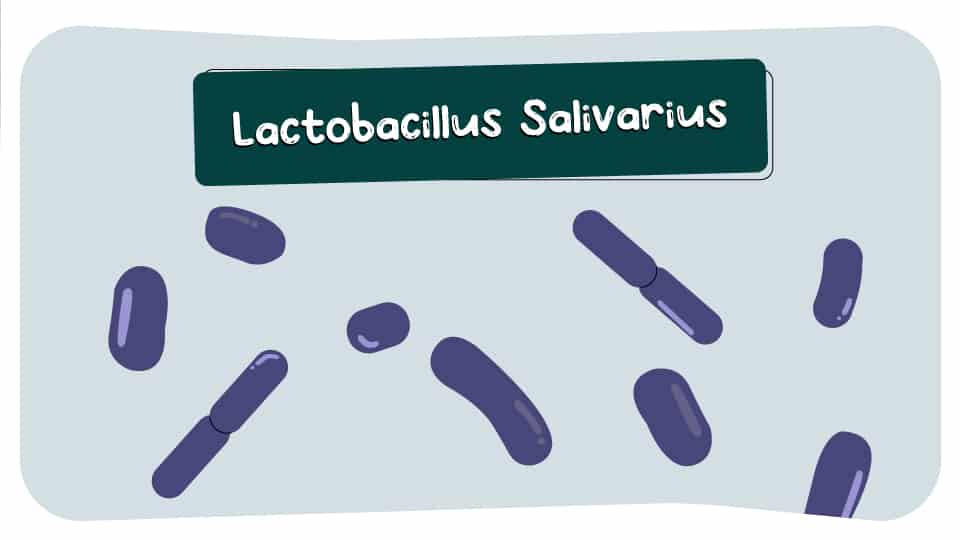6 Lactobacillus Salivarius Health Benefits

Lactobacillus Salivarius is a Probiotic lactic acid bacteria that is said to be found in our digestive tracts and in the saliva in our mouths. That’s why it was named Saliva-rius.
Lactobacillus probiotics are commonly used in supplements and found in various foods. In this guide I will be taking a look at some of those topics and why it’s a popular choice.
Atopic Dermatitis (Eczema)
This clinical trial from 2014 evaluated the clinical efficacy of Lactobacillus salivarius LS01 in the treatment of atopic dermatitis (AD) in 43 children aged 0 to 11 years and treated them with L. salivarius LS01 for 4 weeks.
The researchers assessed the clinical effectiveness of the treatment by measuring changes in itch index and the objective SCORAD/SCORAD index. They found that the children who received the probiotic treatment showed a significant improvement in these clinical parameters from baseline.
This improvement persisted after the treatment was discontinued suggesting that L. salivarius LS01 may improve the quality of life for children with AD and may have promising clinical and research implications but not work as a cure. Dermatitis in older individuals was also studied with L. Helveticus bacteria.
Cholesterol & Inflammation
This 2015 study looked at the efficacy of using Lactobacillus salivarius UBL S22, with or without prebiotic fructo-oligosaccharide and Participants were divided into three groups: a placebo group, a probiotic group, and a synbiotic group.
After 6 weeks, the probiotic and synbiotic groups had significantly lower levels of total cholesterol, low-density lipoprotein (LDL) cholesterol, and triglycerides and higher levels of high-density lipoprotein (HDL) cholesterol compared to the placebo group.
Both the probiotic and prebiotic groups also had significantly lower levels of inflammatory markers like high sensitivity C-reactive protein, interleukin (IL) 6, IL-1β, and tumor necrosis factor α compared to the placebo group.
Both groups also had increased counts of total lactobacilli and decreased counts of coliforms and Escherichia coli in the feces after 6 weeks showing a combination of L. salivarius with FOS was more effective.
Oral Health
In this clinical trial, the effects of Lactobacillus salivarius on caries risk factors were evaluated in 64 healthy volunteers. The participants were divided into four groups and took tablets containing L. salivarius WB21, L. salivarius TI 2711, a substance called Ovalgen DC that contains an antibody against a certain enzyme produced by Streptococcus mutans, or xylitol.
The levels of mutans streptococci and lactobacilli in the saliva, amount of salivary flow, salivary pH, and salivary buffering capacity were measured before and after taking the tablets. The results showed that the levels of mutans streptococci seemed to decrease in the L. salivarius WB21, TI 2711, and Ovalgen DC groups compared to the xylitol group, with no significant differences between the groups.
Lactobacilli levels significantly increased in the L. salivarius WB21 and TI 2711 groups compared to the other groups. There were no significant differences in salivary flow or pH between the groups, but the salivary buffering capacity significantly increased in the L. salivarius TI 2711 group and the Ovalgen DC group compared to the xylitol group.
In a separate short-term administration trial, L. salivarius WB21-containing tablets significantly decreased the number of mutans streptococci in the saliva of eight healthy volunteers. Overall, the results suggest that L. salivarius-containing tablets may increase resistance to caries risk factors.
Infections
In this 2007 study, researchers investigated if Lactobacillus salivarius UCC118 could enhance the health of the host and found that that strain produced a bacteriocin called Abp118. Amazingly, in vivo this significantly protected mice against infection from Listeria monocytogenes.
L. salivarius UCC118 did not offer protection against L. monocytogenes that expressed the immunity protein AbpIM, indicating that the antimicrobial effect is a result of direct antagonism between the probiotic and pathogen, mediated by the bacteriocin Abp118. More studies in humans are needed.
Diverticulitis
This 2019 study from Italy tested the efficacy of a probiotic containing, Bifidobacterium lactis LA 304, Lactobacillus salivarius LA 302, and Lactobacillus acidophilus LA 201 for treating acute uncomplicated diverticulitis.
84 patients with a diagnosis of AUD, who were randomly divided into two groups with one taking the mix of probiotics in addition to conventional antibiotic treatment and the the control taking only conventional antibiotic treatment.
The results showed that the probiotic group experienced a significant decrease in abdominal pain and inflammation, as well as a shorter duration of hospitalization, compared to the control group.
These findings suggest that the probiotic mix may be effective in reducing symptoms and improving outcomes in patients with AUD but, the study was small and further research is needed to confirm these results in larger populations.
Lactobacillus Salivarius Foods
Lactic acid bacteria are commonly found in fermented foods like kefir, kimchi, Sauerkraut and some store bought yogurts.
It's is difficult to know whether or not the foods you are eating contain this strain and most of the time you will just be guessing.
The best option would be to just find a probiotic supplement that has the L. Salivarius strain with a high CFU count listed on the supplement label.
Final Thoughts
From my research it does look likeL. Salivarius may have potential benefits in various areas, like with atopic dermatitis, cholesterol and inflammation, oral health, infections, and diverticulitis.
The thing is though, a lot more research is needed to fully understand the effects of L. salivarius and these studies suggest that it may be a useful tool in improving quality of life in individuals instead of treating conditions.
It's clear that probiotics are not a cure-all and their efficacy really does vary from person to person. Before taking L. Salivarius probiotics, you should consult with a healthcare professional. I am not a doctor.

Alicia Harper is a NASM-CNC Certified nutritionist and the editor of ProbioticReviewGirl.
After suffering from recurrent gut issues she spent years researching Probiotics and the microbiome.
She has tested 29+ different Probiotics and is a probiotics expert. As a probiotic fanatic, she has valuable knowledge to share with the world.